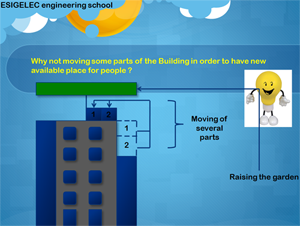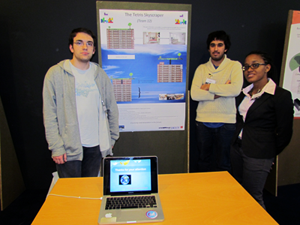 |
||
 |
L'@ctu de l'ESIGELEC - IRSEEM |  |
|
February 2013 - n°4
|
 |
|
Students take part in Europolis 2050 in Belgium |
 For the 2nd year in a row, ESIGELEC has organized a “Market awareness and creativity seminar” as part of the integration week for 100 first-year volunteer students. This seminar aims to help them develop creative approaches and open their mind to different market sectors. Speakers and mentors were provided by Rouen Business School, as they have a similar program to which ESIGELEC teachers are contributing. As part of the seminar, the students participated in a competition in groups of 3 - 4 students. They had 24 hours to come up with an innovative project for the future, technology-based or otherwise. Then they had to present their project to judges using a PowerPoint presentation or a prototype. This year, the ideas put forward by the 30 groups of students were particularly innovative and certainly impressed the judges. In the end it was a hypo-vigilance at the wheel project that won the jury's vote. The group, consisting of Déborah Baranow, Fabien Cuny and Léo Reviron, designed a system of heart rate monitors fitted to the steering wheel and a pressure sensor on the gearstick to assess the driver’s mood. The music on the car radio would automatically change to suit the mood : calming music for stress, music with a beat for tiredness or an alarm to wake the driver up should he/she doze off. The "IntelliMood/Smart music system based on mood" project won the judges over with its originality and road safety features.  The competition consisted in imagining a 2050 city, which had to be completely autonomous and self-sufficient. The candidates were to follow certain additional rules : individual cars were not allowed inside the city, for instance, and each square inch had to be used as best as possible in order to limit transports and pollution. Finally, nothing could be outside the city except for farms. Even though they didn't win any of the three prizes at stake, the French students keep a good memory of the competition : "it was a good experience where we were able to put forward our group work, our reflection, our creativity and innovation, said Léo Reviron. Even though we weren't the best in the competition's domains, which were urbanism and social issues, we were still able to develop an idea and, most of all, we respected the deadline." Déborah Baranow added : "Within a few hours, we had to appeal to our imagination, our creativity, without putting its feasibility in question. And I think that was the hardest part ; we couldn't let ourselves say : it's not possible. I think that even an eccentric idea can become something amazing if you develop it properly." Fabien Cuny, the group's leader, appreciated the international dimension of the event : "I found this experience very enriching. Almost everything was in English, we had to develop our project and think in English, which was very interesting. Then, there were milestones throughout the competition and we had to write and present documents. It reinforced our experience of the English language, as we had to set out our arguments to defend our project."  |
|
Contact : Mathieu Chevrier, Chargé Carrière - Employment & Careers Observatory, Corporate Relations and Apprenticeships, mathieu.chevrier@esigelec.fr
|